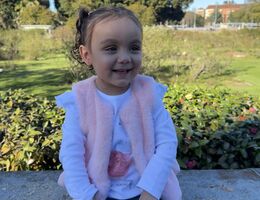
From a young age, Daniel Lamb, MD, navigated the challenges of Goldenhar syndrome, sparking a passion for medicine that has brought him full circle. Today, he serves as the Medical Director of the Craniofacial Team Clinic, where his medical journey began.
"Interacting with the Craniofacial Team Clinic members as a kid and teen first ignited my interest in medicine," said Lamb. Reflecting on his experiences as a patient and his parents' insights on caring for a child with craniofacial conditions, Lamb realized he had a unique perspective to offer the medical field — especially in pediatric medicine. His goal was to assist families and their children on their medical journeys.
As the Medical Director of the Craniofacial Team Clinic, Lamb wears many hats. His primary responsibilities include ensuring that the clinic meets and exceeds the standards of care for craniofacial conditions, guided by the American Cleft Palate-Craniofacial Association's parameters. Balancing this with his duties as a general pediatrician, he focuses on managing patients' care, addressing both their craniofacial and overall health needs to ensure comprehensive treatment.
July marks Cleft and Craniofacial Awareness Month, a time of deep personal and professional significance for Lamb. "Growing up, I didn't know anyone with a craniofacial condition outside the medical appointments. I didn't meet another person with Goldenhar syndrome until one of my rotations during the fourth year of medical school,” Lamb said. Today, organizations like the Children’s Craniofacial Association and myFace provide invaluable support and a sense of community for those with craniofacial conditions and their families.
Patients with craniofacial conditions face numerous challenges, ranging from accessing specialized care to managing social and emotional impacts. Lamb takes pride in the dedicated team at the Craniofacial Team Clinic, who work tirelessly to address these challenges. The members of this multidisciplinary clinic collaborate to develop creative solutions and comprehensive care plans for their patients, some of whom come from over 200 miles away.
Lamb encourages families with craniofacial conditions to take an active role in their care. He emphasizes the importance of asking questions, learning about their specific conditions, and actively participating in the medical decision-making process.
If you want more information about the Craniofacial Team Clinic, visit online.
